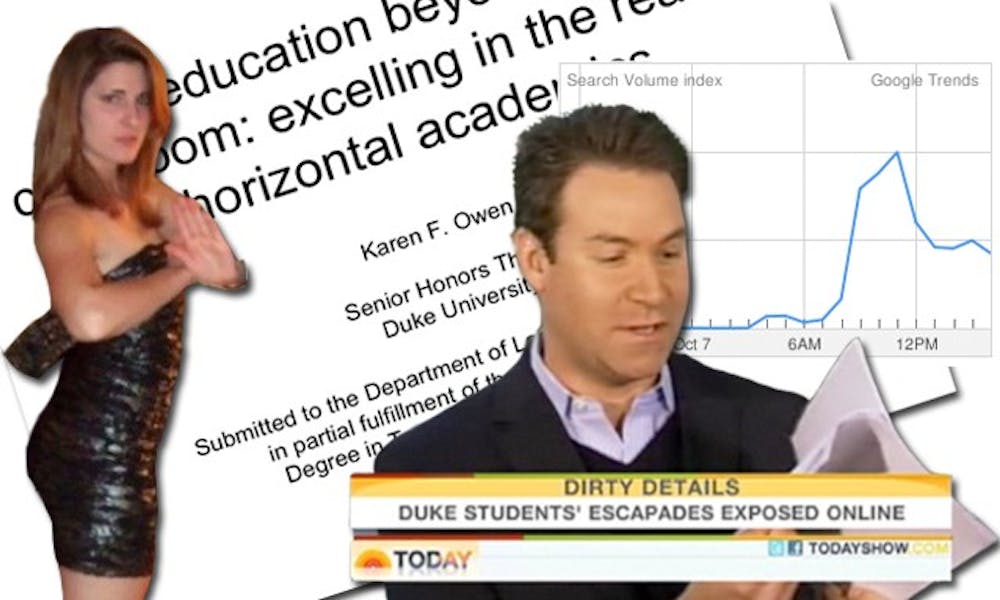The sexual practices of Duke students are back in the spotlight, four years after lacrosse case coverage subjected campus culture to national examination.
Reporters from major news outlets descended on campus yesterday after a detailed list of a Duke alumna’s sexual encounters went viral. For some, the attention the list has attracted revives questions about Duke’s social norms and rekindles concerns over public perceptions of the University.
“People have this impression that Duke is this culture of these hypersexual people, and unfortunately events like this don’t help our case,” said Duke Student Government President Mike Lefevre, a senior.
He said he was disappointed to see national media outlets like The New York Times and NBC’s Today Show on campus covering the situation. Lefevre said a New York Times reporter interviewed him Thursday about the sex list.
“This is not the kind of story that should be getting national attention,” Lefevre said. “It doesn’t reflect well on the University, on the student body, and it certainly doesn’t reflect well on the national media.”
The 42-slide PowerPoint that has drawn widespread attention was meant to be shared between friends. In it, Karen Owen, Trinity ’10, vividly describes the sexual performance of 13 current and former Duke students, all of them varsity athletes and many of them lacrosse players.
After Owen sent the PowerPoint to a few friends, it eventually made its way across listservs at Duke and then onto sites such as Jezebel, The Huffington Post and CNN. At one point Thursday night, “Karen Owen Powerpoint” was the second most-searched term in the United States on Google. “Duke Powerpoint” was 10th.
Deadspin, a sports blog, and Jezebel, a blog that covers women’s interests, first posted the PowerPoint last Thursday. The document has since been viewed more than 2 million times on the sites.
Deadspin initially posted the presentation complete with the names of the men, but later removed them. Jezebel interviewed Owen, but did not initially identify her.
“I regret it with all my heart,” Owen told Jezebel. “I would never intentionally hurt the people that are mentioned on that.”
Jezebel later posted e-mails suggesting that Owen might be offered a book deal related to her PowerPoint.
Owen did not respond to an e-mailed request for comment Thursday evening, and a message left on her home telephone was not returned. The men named in the PowerPoint could not be reached for comment or declined to speak with a Chronicle reporter.
Duke Sports Information Director Art Chase said, “Duke Athletics has no comment on this.”
Vice President for Student Affairs Larry Moneta said his department has contacted the students mentioned in the PowerPoint to offer support.
“On a personal basis, I’m saddened by the behavior,” he said. “Many of the circumstances that are referenced in it continue to make me really concerned about some of the judgments and some of the norms that persist.”
But Moneta and several students pointed out that Duke is far from the only college where people have alcohol-fueled sexual encounters.
“I don’t find it that big of a deal,” said freshman Grace Benson. “A lot of college campuses are really promiscuous. I don’t think [Duke] should be singled out.”
Moneta said the PowerPoint should not be linked to past depictions of Duke’s social scene. But a Today Show segment broadcast Thursday drew parallels between Owen’s list and seamier elements of Duke culture highlighted during the lacrosse case.
The reporter, Jeff Rossen, mentioned the Duke lacrosse case—in which several players were accused of rape before being cleared—and called the list a “new sex scandal.”
“In 2007, the charges were dropped, but the damage was done,” he said on the show.
Get The Chronicle straight to your inbox
Sign up for our weekly newsletter. Cancel at any time.
During the lacrosse case, the Duke social scene was commonly portrayed as an atmosphere that embraced a cavalier attitude toward sex. Publications such as Rolling Stone described Duke nightlife with images of drunken hookups, foam parties and casual sex.
Michael Schoenfeld, vice president for public affairs and government relations, said he was concerned that coverage of the PowerPoint could revive those perceptions of Duke.
“What’s concerning about it is the potential for something like this to reinforce stereotypes,” Schoenfeld said. “Do I think this is going to long-term define Duke? The answer is no, of course not.”
Matthew Chase and Joanna Lichter contributed reporting.

